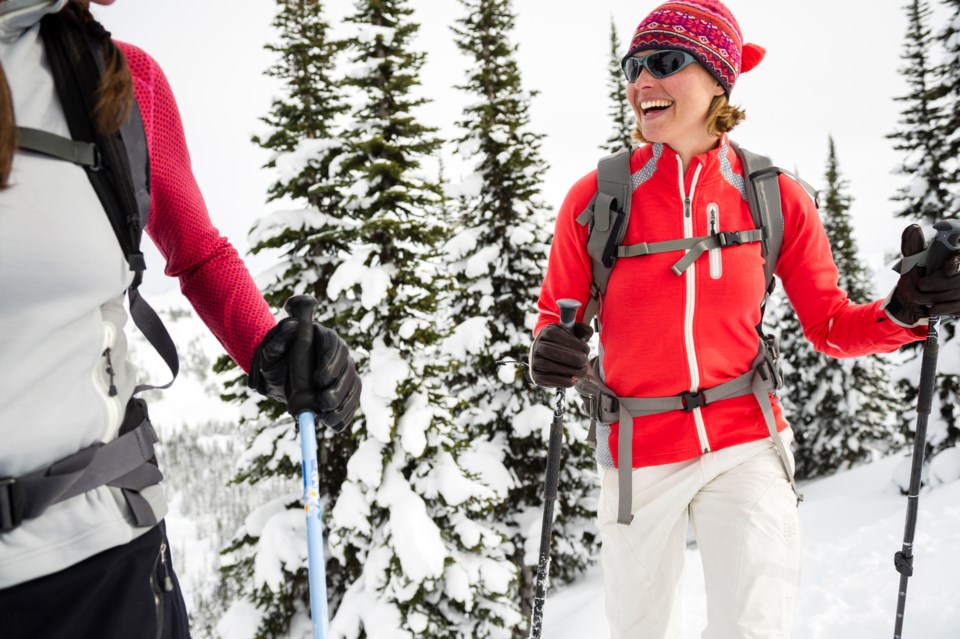Anybody who has lived in Whistler for more than a few years will soon realize that we really only have two seasons here: our eagerly anticipated winters, which usually last a full six months; and please-don’t-catch-fire summers, which may only last a few weeks and are by no means guaranteed. The rest of the time is generally grey and wet and doesn’t deserve a name (although you should always make a point of getting out and doing stuff anyway, otherwise life here can get boring).
Winter in Whistler is a state of mind as much as a state of readiness, and it pays to be prepared mentally, physically and financially. This will be my 24th winter season in Whistler, and I’ve learned a few things in that time, usually the hard way. At the risk of sounding patronizing, here’s the best advice I can give to newcomers:
Stock up on extra food because you don’t need, or want, to go on errands during a blizzard. It doesn’t matter how awesome a driver you are, or how good your tires might be, you’re in the way—the plows do a far better job making things safe when the roads are empty and untracked. Honestly, sometimes it feels like people wait for the flakes to start falling to realize they’re running low on orange juice. A snowstorm is never business as usual.
You should also be ready for a power outage that can last for hours. You need flashlights, candles, food that doesn’t need to be cooked, etc. We get blackouts every winter, usually during storms when trees fall on powerlines or transformers spontaneously combust.
In that vein, we also live in a region that’s prone to rockslides, floods, washouts, and car accidents that can close the road for a long time, so make sure you have an emergency kit in your vehicle and at home. Always keep your car gassed up as well–saving three cents a litre by waiting to fill up in Squamish isn’t worth the stress of sitting in traffic behind an accident and wondering if and when you’re going to run out of gas.
On the mountains, always spot landings before getting airborne, know where you are to avoid getting lost out of bounds, and always stay out of closed areas in the early season—I cannot stress this enough. Closed zones are not secret powder stashes even though they often look that way from the top. These are areas with open creeks, exposed trees and stumps, tree wells, bare patches of mud, and all kinds of other hazards. I learned this lesson standing up to my knees in freezing water, trying to figure out how to unbuckle my board without drowning.
Speaking of hazards, please do Future You a favour and put some money away. There’s a surprisingly high chance that you and/or one of your roommates is going to be injured at some point in the season and will be unable to work. Whoever sells the Whistler Health Care Centre crutches and arm slings could probably buy and sell Elon Musk.
If (and it’s really more of a “when”) you get hurt, you’ll still need to cover rent, utilities, groceries, Netflix, weed, etc. Start building a nest egg early, putting enough away to get you through a four- to six-week broken bone or ligament strain. And if you make it through the entire season unscathed, then hey, money for a bike!
It really helps to keep a budget and to go out a little less to keep your costs down. It’s an easy town to find work—you could have five jobs if you want them—but it’s just as easy to max out your cards, party away your savings and go broke. Or broker. I came to Whistler with $24,000 in student debt and a credit card with a $500 limit and as a result had a second job for my first eight years here.
Learning to say “no” is key and, as cruel as this sounds, avoid “going-away” parties like the plague. You’ll get invited to a lot of them in a transient town like this, enough that it gets expensive. By all means, say your goodbyes but avoid the expensive sushi dinners and nights out on the town every single time someone leaves because (and it will take a while to realize this) there’s a good chance you’ll never see those people outside of social media again.
Getting back to the “six-months-of-winter” thing, it’s a lot. You need things to do. Video games, board games, puzzles and hobbies. And you need patience, which can get frayed being cooped up with the same people for months on end.
Take your wellness seriously. Go outside. Buy grips for your shoes and get steps. Take vitamins; C and D are particularly important. Eat well. Go to a gym. Go snowshoeing or cross-country skiing if you can afford the extra gear. Wash your hands often, don’t touch your face, and avoid all the viruses that go around and around all winter long as the whole world comes to Whistler to cough on our door handles.
Warm clothes and good quality gear are a must to keeping your sanity—underlayers, snow boots, mitts for those days when gloves don’t cut it, and waterproof outer layers for those days when the snow is two degrees away from falling as rain. Being comfortable outside is everything here.
Most importantly, keep a sense of humour. Ignore all the long-timers like myself who complain about everything and think Whistler is going downhill—and not in the good way we’re all here to enjoy.
You’re going to have the time of your life.




